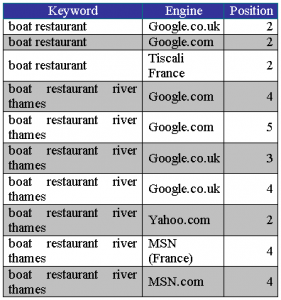Published: August 14 2008
By Brandt Dainow
Think the days of unscrupulous SEO “experts” are gone? Think again. Here’s a list of techniques being used to scam clients out of money.

In my last article, I discussed the best way to use SEO services. I received a surprising amount of email from readers, all of whom had unhappy experiences with SEO. Quite a few complained that they had burned a great deal of money and got a great deal of nothing back for it. Many of the complaints they had surprised me. People complained about SEO suppliers doing things that I thought we had long ago eliminated. I thought the marketing community had smartened up and driven the SEO carpetbaggers out of town. I guess I was wrong.
It made me realize that a great business opportunity exists, one that I thought had dried up long ago. Not so. I can now give you the great news: There is still a pot of gold at the end of the internet rainbow — you can still rip people off with SEO! This article explains how you can rip people off by merely pretending to provide SEO services for them. On the other hand, if you are somebody who purchases SEO services, please do not read this article, as it would mean you could no longer be ripped off by SEO sharpsters.
Rip-off #1: Don’t provide position reports
SEO services involve promoting a specific phrase in a specific search engine. It does not matter if you are targeting multiple search engines or promoting multiple phrases or — as is usually the case — both. You still have to target your efforts at a single results page in a specific engine. Each search engine has its own rules; that is how they compete. So what works for one search engine will not work for another. This means the competitors inside each results page are different from engine to engine. Therefore, how you respond varies according to the individual search engine rules and the nature of the competitors’ sites listed by that engine.
In theory, your job as an SEO provider is to ensure that your client’s site matches each search engine’s rules better than the competitors they have in that search engine for the targeted search. After all, potential visitors will search in a specific search engine with a specific phrase. If you have done your work well (joke), the client’s site will appear in the results page for that search.
Your performance should therefore be judged by the place the client site occupies in each search engine’s results for each targeted phrase. If you genuinely wanted to be judged on the basis of what you achieved for the client, then you would provide them with a list of the positions that the target phrases hold in each search engine, a “position report.” Entries in a position report would look like this:

Being forced to provide data like these would be disastrous for any rip-off SEO company. If you were not achieving anything, it would be instantly obvious to the clients from the reports you supply them. If positions are falling or nonexistent, the client would be able to tell. So never give detailed “position reports.”
If possible, try to avoid providing any reports at all. A surprising percentage of customers are happy to pay you every month despite having no idea what, if anything, you are doing for them.
Unfortunately, some difficult clients expect some form of report. The solution for these people is to provide meaningless reports filled with technical doubletalk (see Rip-off #2).
Rip-off #2: Talk rubbish
If you want to sell garbage SEO services, it is important to understand that most of your customers have no idea how SEO works or what you do. This means you can bamboozle them with made-up jargon.
My particular favorite, used by one of the largest SEO agencies in the world, is to talk about “capturing percentages of the search space.” I recall reading with joy the line in one of their reports to a client:
“The site has successfully captured 10 percent of the search space for this retail sector.”
This is pure genius! It sounds great, makes the client feel important and powerful, makes you look good, and yet it communicates absolutely nothing. Let us examine this work of genius in more detail and see what we can learn from it.
We see that the client has captured 10 percent of something called a “search space.” The client presumes that this means search engines. But which ones? All of them? Unlikely. Some are very small, and many of them do not work in English. Does this include national variations of major names, such as Google.za (South Africa) as well as Google.com? So to talk of search space is meaningless unless it is defined. What does capturing 10 percent mean? Is this 10 percent of the results? How could anyone calculate that? How many pages are we surveying? Are all positions of equal value? Is No. 1 worth the same as No. 10? Or No. 100? Does this mean the client site is listed 10 times for every 100 results? And how many pages of results were reviewed?
You see the genius? Without a definition of what 10 percent means, how that number was calculated and which search engines are included in this “search space,” the client learns nothing, yet manages to feel good.
Should the client actually ask for definitions of the search space, you can just throw him a list of search engines. However, if the client asks how you calculate 10 percent, things get difficult. The best defense is to hide behind intellectual property rights by telling the client the formula is part of your unique expertise (see Rip-off #3).
Another lovely piece of made-up terminology the above-mentioned company uses is to distinguish between crawl maps and site maps. Everybody knows how to create a site map, but only this company knows how to create a crawl map. In fact, since there is no such thing, only this company even knows what it is (and it’s not telling). Having convinced the client a crawl map is important, the client will discover that none of his technical staff know how to create one, or even what one is. This proves the superior expertise of the SEO company and forces the client to use its services. Of course, you must never supply a crawl map or explain how to make one. Instead, you must tell the customer that it is proprietary technology that you cannot reveal (see Rip-off 3).
Rip-off #3: Hide behind intellectual property rights
We all know that the techniques required for SEO can be found in many books and on many websites. Luckily, the customer does not. If they ask for proof that you have done something that you have not, try to hide behind claims of intellectual property. I recently saw this done with regard to link building. A company had been paying for link-building services but could see no benefit from them. Its SEO company claimed to be gathering 10 to 20 links per month. This is a carefully chosen number — not too many to seem extravagant and not too few to seem lazy. When asked to provide a list of the links it had obtained, the company refused. The service provider explained that the sites in which it had placed links had been carefully identified through research using its SEO expertise. The company said that it could not provide this list because it would threaten its carefully created intellectual property. Believe it or not, the client accepted this lovely piece of legal waffle — and continued to pay for the services.
Rip-off #4: Offer meaningless guarantees
Nothing works to allay a prospect’s fears or doubts better than a guarantee of success. The skill lies in offering something that will cost you nothing. My particular favorite is the “we’ll do it again if we achieve nothing” guarantee. All you have to do is tell customers you will give them 12 months of free service if you do not achieve their goals by the end of the first year. Then, you do nothing for them all year except send them invoices and collect their money. At the end of the year, when they say they are unhappy, you say, “no problem, we’ll give you another year for free.” Then you do nothing for the client for second year. Sounds too easy to be true? I didn’t make this idea up myself; I saw it being used by a very successful medium-sized SEO company.
Another guarantee that works well is to guarantee No. 1 placement in 75 percent or so of the world’s major search engines. The trick to this one — and this is a very popular trick — is to provide a list of target engines that includes very minor search engines. These are ones that no SEO company bothers with because they have insignificant market share. Of course, you include Yahoo, MSN and Google in your list. However, you don’t waste any effort on them; they are too hard because there is too much competition for placement on them. You have to know your business to succeed with these three. However, if you include them in a list of 10 or 20 other search engines, all you have to do is get decent places in the others to meet your stated goal. Of course, the client will see no benefit, but he can hardly sue you; who wants to get into a legal debate about the definition of a “major” search engine?
Rip-off #5: Focus on page rank
Google’s page rank is a measure of a site’s importance on a global scale. Google uses it to determine how frequently to visit a site and what percentage of the site to index on each visit. It is not the sole determinant of such things, but it has a major influence.
Fortunately for us, many people believe that page rank influences a site’s positions in the listings. This is not true. It does not matter how important a site is. If it genuinely does not match a search phrase as well as a less important site, the less important site will be listed higher.
People focus on page rank because it is visible. Most clients (and many SEO engineers) believe page rank is an indicator of your positions in listings. Don’t disillusion them. Since page rank changes slowly, you can consume a large amount of their cash before you are expected to achieve anything.
Rip-off #6: Focus on link building
A site’s page rank is largely determined by the number and quality of the links that lead to that site. This has led many people to believe that the process of search engine optimization is to first ensure the site is well optimized, then to focus on getting links to it.
The critical thing that most people miss is that the quality of the links is more important than the number. Google assigns a nominal value of one to all the links coming out of a site. Thus, if a site has 10 outgoing links, each of those links has a value of 0.1. If a site has 100 links, then each of them has a value of 0.01. Furthermore, if the site has too many links, Google downgrades it because it is obvious that the links are there simply to try to influence Google. Such a site is known as a “link farm.” Google hates link farms.
Since clients do not realize the importance of link quality, you can focus on getting as many links as possible, ignoring quality, and still keep the customer happy. You can work with link farms (there are many in India), thereby getting the customer hundreds or thousands of links with relative ease. This generates the illusion of a great deal of work — for which you will be paid. Of course, the customer will gain no benefit and may even be downgraded by Google for being linked to by link farms. However, in this case, you can truthfully say you have done what you were paid to do and blame Google.
If you want to make it even easier, you can create your own sites and stuff them with links to your clients. Some SEO companies even create software to do this automatically, generating huge quantities of links with no labor costs. Of course, Google is not stupid; dozens or hundreds of sites sitting on the same server, cross-linked to each other and to clients, often with more links than content, just smells bad. It is pretty obvious to Google that this has been done by a single organization solely for the purpose of trying to trick Google. Google hates being tricked, so it will ban these sites as fast as possible. That’s not a problem for you — simply buy some more cheap domain names and move the sites to a different server. If you plan to use this strategy, as some major SEO companies do, you need to plan to migrate your whole site complex to a new server every year or two.
Rip-off #7: Spam the search engines
Google lists a number of SEO techniques that will get a site banned. Some years ago Yahoo and Google issued an announcement that they share blacklists of banned sites. The reason search engines ban these sites is that there are some tricks that work. Because they work, Google has no defense except to ban the URL. This is one of the reasons why Google employs thousands of people solely to check results.
A common technique you can use is keyword stuffing. To do this, you simply place a large number of keywords at the bottom of the client’s pages. We used to be able to do this invisibly, making the text for the keywords the same color as the background. However, Google detected this and now drops pages that contain text of a color close to the background. This is why you will often see sites with a huge number of plainly visible keywords at the bottom of the page. If you want to be really effective, each of these keywords should be linked to a relevant content page in the client site.
Some SEO companies generate keyword-stuffed pages themselves on their own sites and then do automatic redirects for visitors to the client site. Thus, the search engine sees the SEO page while humans see the client’s site. This technique is a variety of “cloaking.” Cloaking involves serving one set of content to search engines and different content to visitors. There are a number of techniques that can be used to do this. All of them work. Again, this is why Google employs many people to manually check results.
Some SEO companies invested in cloaking technology — systems that automatically generated cloaked pages or entire cloaked sites. Of course, sooner or later they would get detected by the search engines and have their sites banned. Often the client’s sites were banned too. These SEO companies would simply declare their businesses bankrupt so they didn’t have to return any fees. They would then reform under a new company with a new name and simply start again. I saw one bunch of people do this three times before anybody in their area cottoned on.
Conclusion
These techniques offer you a toolbox of tricks with which to extract money from naïve SEO clients. To be a successful rip-off SEO company, you need good salespeople who can gather new customers on a regular basis because you won’t get much repeat business. You also need to lock clients in with one-year contracts. This is not too difficult because most people understand it takes many months, if not years, to achieve results in SEO. It is therefore unfair to judge any SEO company — even legit ones — on the strength of a few months’ work.
Of course, if you are operating like this, it is absolutely critical that you do not let potential clients talk to existing clients. Never provide referrals! Talking to existing clients of an SEO company is the best way to determine the quality of the company’s work. If you’re no good at SEO, don’t let this happen to you.
Many SEO companies have built hugely profitable businesses using the techniques I have outlined. Some of them are major international brands. The critical thing to avoid is customers who have read this article. They will be extremely difficult to fool.
